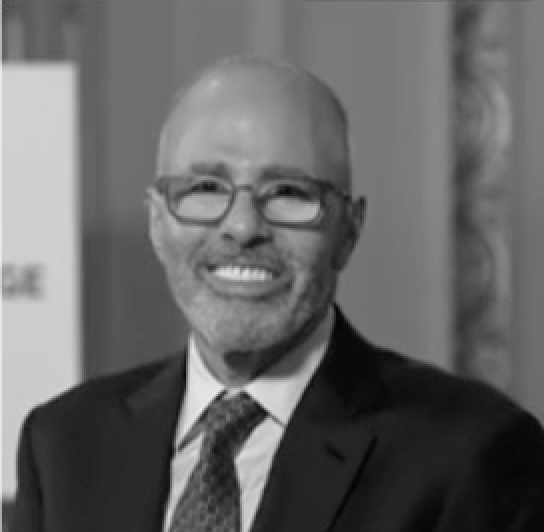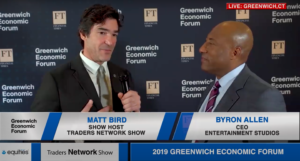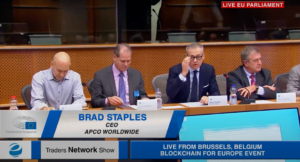EU Panel Discusses Oversight as it Relates to Blockchain and Financial Markets – EU Parliament
Contributed by: Show Editorial Team
Theo Moore, Syed Kamall, Peter Kerstens, Mark Wetjen, Dan Morgan and Maya Zehavi Discuss Fintech at Blockchain for Europe Summit (EU Parliament)
HIGHLIGHTS
-Blockchain technology is not ripe enough to cause a disruption in society
-Data transformation is a major issue
-Focus on cross-border payments since it is hugely inefficient and expensive
Operating a financial market doesn’t take rocket science. At least not according to Peter Kerstens, Senior Advisor to the Director-General of the European Commission.
Financial market infrastructures, “really are exercises in account and record-keeping,” Kerstens said during a panel discussion at the 2018 Blockchain for Europe event held at the European Union Parliament. “What is blockchain? What is a distributed ledger? It’s a record-keeping system.”
In other words, implementing blockchain could very well create more efficient financial transactions, he said.
Kerstens was speaking as part of the Blockchain in FinTech panel, which delved into the ways in which blockchain could change the financial services sector and what oversight would be required as a result. Moderated by Theo Moore, Deputy Managing Director of APCO Worldwide, the panel also featured Syed Kamall, an EU MEP serving on the Economic Affairs and Trade Committees; Mark Wetjen, Global Head of Public Policy for DTCC; Dan Morgan, Head of Regulatory Relations for Europe Ripple; and Maya Zehavi, CEO and Founder of ONTICI. The event was filmed live by the Traders Network Show, hosted by Matt Bird.
Starting off the panel, Kamall, an MEP, said he approaches any issue skeptically—not to be destructive, but to be constructive. Thus, he had a few questions about the use of blockchain.
“What can it really do now to make things more efficient and reduce transaction costs? What can it do in the future? And what are the things that we have to be careful about?”
Kerstens, whose role falls on the regulatory side, said blockchain could have huge upside in reducing transaction inefficiencies. However, that doesn’t mean the European Commission was ready to back wide scale adoption of the technology.
Central to the issue is whether financial markets must be run in a centralized way. Unlike centralized systems, which funnel transactions through a few, highly regulated institutions, distributed ledgers enabled by blockchain don’t currently have a unifying authority. A decentralized system certainly has less friction—and less middlemen-associated costs—but there is potentially more risk created by that lack of oversight, the panel discussed.
Kerstens said the European Commission favors a centralized system because of its stability. However, he said the body also recognizes that a centralized system creates vertical silos, which hurt competition—something the EC opposes.
“So we are a bit conflicted, but that’s not necessarily a problem at this stage because the technology is not yet ripe enough to realize this disruption that may happen at some [point,]” he said.
Other panelists, like Morgan, who represents a technology company using blockchain to enable cross-border financial transactions, said blockchain stands to improve financial market infrastructure. He said Europe Ripple’s tools make it easier and less expensive to send money abroad. He compared the transactions completed by the firm’s tools to Whatsapp messages sent between two people rather than emails with PDFs sent between two banks.
Morgan said overseas transactions at the time of the panel discussion were 10 times the cost of domestic transactions. In an increasingly globalized world, such extra burden could become a bigger and bigger problem, possibly necessitating a more streamlined system enabled by blockchain, he said.
Other panelists questioned the security as well as the ownership of data in decentralized transactions. If we rely on blockchain, does the technology company that created the software then have some ownership over the data shared on its product? Is that company owed royalties? And without a regulatory body, who gets to decide whether information is too sensitive to be made available on a public ledger?
With all of these questions, no one on the panel advocated for a kind of Wild West, where financial transactions taking place via blockchain went entirely unchecked. In fact, Wetjen argued that, because people will likely always support a financial system they can trust, some level of oversight will always be in place. Therefore, he said, the impact of blockchain on the financial services sector will probably be limited.
“If policymakers, because of the public, insist that there be trusted entities, there are always going to be intermediaries, and there is always going to be the complexity that this technology is trying to get around,” Wetjen said. “There is always going to be some entity, whether it is a consortium or what have you, that is providing the particular governance around the blockchain.”
As a result, Wetjen said, blockchain’s biggest impact may very well be in an entirely different industry.
(Written by Andrew Waite; Editing and revisions by Nicole Liddy)
Links: Original Article
PR and Media By: CommPro Worldwide
All rights reserved to the Traders Network Show. No part of this publication may be reproduced, distributed, or transmitted in any form or by any mean including; photocopying, recording, or other electronic or mechanical methods, without prior written permission of the publisher, except in the case of brief quotations embodied in critical reviews and certain other noncommercial uses permitted by copyright law. For permission requests, write to the publisher addressed “Attention: Permissions Coordinator”








